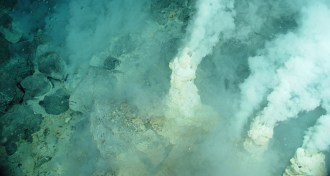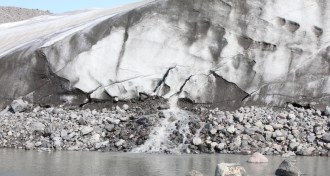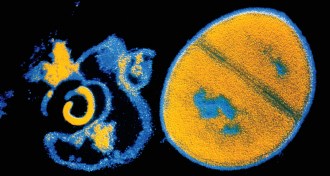Beth Mole

Trustworthy journalism comes at a price.
Scientists and journalists share a core belief in questioning, observing and verifying to reach the truth. Science News reports on crucial research and discovery across science disciplines. We need your financial support to make it happen – every contribution makes a difference.
All Stories by Beth Mole
-
 Climate
ClimateForest fires may speed demise of Greenland’s ice sheet
Black carbon released by burning woodland darkens Greenland’s ice sheet, quickening its melt.
-
 Materials Science
Materials ScienceRecyclable superplastics made with old chemistry
A new durable plastic and a self-healing gel are the first high-performance polymers that are easily recycled.
-
 Climate
ClimateAntarctic glacier melt is unstoppable
The inevitable collapse of Antarctic’s western glaciers could raise global sea level by more than 4 meters in coming centuries.
-
 Genetics
GeneticsOrganism with artificial DNA alphabet makes its debut
Using DNA molecules other than A, C, G and T, scientists have created the first living organism with an expanded genetic alphabet.
-
 Climate
ClimateCrop nutrients may drop as carbon dioxide rises
Many staple grains and legumes pack 5 to 10 percent less iron, zinc and protein when grown at carbon dioxide levels expected midcentury.
-
 Microbes
MicrobesViruses buoy life at hydrothermal vents
Using hijacked genes, deep-sea viruses help sulfur-eating bacteria generate power in the plumes of hydrothermal vents.
-
 Climate
ClimateGlacial microbes gobble methane
While some bacteria produce methane in Greenland’s melting ice sheet, others may consume the greenhouse gas as it escapes.
-
 Materials Science
Materials ScienceBlender whips up graphene
Easy recipe makes large quantities of graphene using kitchen blender.
-
 Health & Medicine
Health & MedicineUnsolved drugs
Long thought to launch precision attacks against bacteria, antibiotics may also cause lethal collateral damage, according to a controversial theory. Exploring how these compounds kill may reveal new ways to fight antibiotic resistance.
-
 Health & Medicine
Health & MedicineTriclosan aids nasal invasions by staph
The antimicrobial compound triclosan, commonly found in soaps and toothpaste, may help Staphylococcus aureus stick around.
-
 Climate
ClimateIPCC calls for swift switch to alternative power
Rapid adoption of green power production will be necessary to avert a climate crisis, latest IPCC report says.
-
 Life
LifeCommon lung infection suffocates with single protein
A Respiratory Syncytial Virus, or RSV, protein creates clumps of dead, bloblike lung cells.